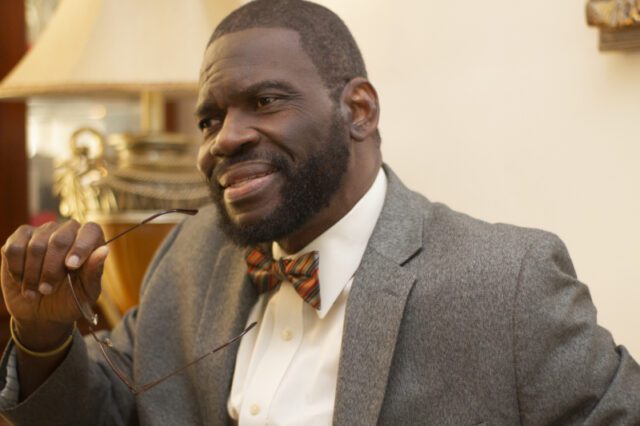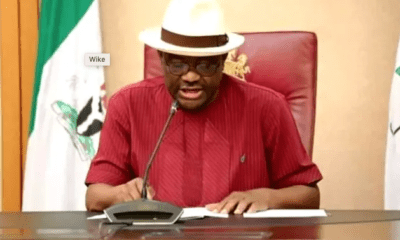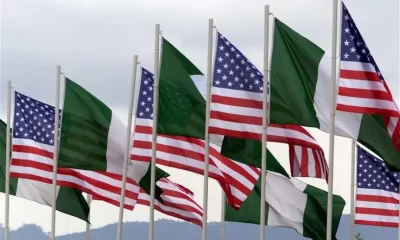Political Issues
Reevaluating Leadership in Law Enforcement and Security: ACP Adejobi’s Need to Embrace Empathy, Sensitivity, and Nyesom Wike’s Focus in Tinubu’s Era -By John Egbeazien Oshodi
The ensuing maelstrom of opinions and debates swirling around the ‘No gree for anybody’ slogan delves deeply into the intricate balance between preserving public safety and upholding the sacrosanct tenets of freedom of speech within a democracy. Legal luminaries and impassioned activists fervently argue that this slogan constitutes a distinctive form of cultural expression and a resolute stance against oppression, asserting that it must be upheld as an inviolable fundamental right.

In the aftermath of a deeply unsettling incident that unfolded in Abuja during the early days of January, our collective consciousness has been jolted not only by the harrowing tragedy that transpired but also by the imperative for a profound recalibration in our approach to leadership within law enforcement agencies.
This heart-wrenching incident saw the abduction of six siblings and their father from their family home in the Bwari Area Council, Abuja. Tragically, it culminated in the loss of one sister’s life, with the father’s younger brother, Abdulfatai, suffering a brutal fate at the hands of the abductors. The five remaining daughters are still in captivity, their captors ruthlessly demanding an exorbitant ransom of N100 million for their release.
However, what intensifies the profound sorrow surrounding this situation is the response emanating from Assistant Commissioner of Police (ACP) Olumuyiwa Adejobi, the Spokesperson of the Nigeria Police Force, when confronted by a concerned individual on Twitter. His seemingly callous retort, “Don’t cry more than the bereaved, Ok,” resounded as a discordant note, laying bare a profound void in empathy, sensitivity, and ethical responsibility. These words, particularly when uttered by a police officer entrusted with the solemn responsibility of safeguarding citizens, should have remained far removed from the public sphere, particularly in light of the grave circumstances at hand.
Yet, this incident is not an isolated occurrence; it serves as a stark manifestation of a more pervasive issue— the woeful disconnect between the Nigeria Police Force and the sentiments of the public it serves. It is deeply disconcerting that the police fundamentally misunderstood the ‘I No Go Gree’ slogan, initially embraced by Nigerian youths as a passionate expression of discontentment with the prevailing status quo. Rather than recognizing it as an outpouring of frustration, the police perceived it as a looming threat, articulating concerns about potential crises based on enigmatic ‘intelligence reports.’ If these reports held any validity, they should have been promptly disseminated to all law enforcement agencies, fostering a culture of collaboration and a united front against the scourge of insecurity. However, the military’s endorsement of a similar slogan, ‘No gree for terrorists,’ directly contradicted the stance adopted by the police. This disconcerting dissonance not only casts a pall of doubt over the credibility of the so-called intelligence reports but also spotlights a troubling lack of coordination and comprehension among our nation’s security apparatus. The consequence of this discord is the burgeoning erosion of trust in the national police and an impassioned call for alternative, more effective security strategies.
The ensuing maelstrom of opinions and debates swirling around the ‘No gree for anybody’ slogan delves deeply into the intricate balance between preserving public safety and upholding the sacrosanct tenets of freedom of speech within a democracy. Legal luminaries and impassioned activists fervently argue that this slogan constitutes a distinctive form of cultural expression and a resolute stance against oppression, asserting that it must be upheld as an inviolable fundamental right.
This robust clash of perspectives throws into sharp relief the complexities of interpreting and addressing expressions of dissent, underscoring the absolute necessity for empathy, sensitivity, and unwavering ethical conduct to permeate every facet of law enforcement.
In light of these disconcerting incidents, it becomes incontrovertibly evident that a seismic paradigm shift is imperative in our approach to leadership within law enforcement agencies. It is no longer sufficient to place undue reliance on academic qualifications and procedural knowledge. What our nation yearns for is the nurturing of an all-encompassing culture—one steeped in empathy, understanding, and steadfast ethical conduct—among those entrusted with the solemn duty of ensuring the safety and well-being of our communities. This necessitates a profound overhaul of the entry-level positions within law enforcement agencies. Irrespective of their academic backgrounds, all recruits must commence their careers at the same entry level. They should then partake in specialized training programs that transcend conventional teaching. These programs must immerse candidates in the profound tenets of law enforcement, with an unwavering emphasis on empathy, human relations, ethical conduct, and the art of effective communication.
Candidates equipped with specialized skills—those who have undergone extensive training in Public Relations or hold degrees in the same field—should be afforded the opportunity to assume specialized positions. This approach will ensure that individuals in positions of authority do not merely possess proficiency but are deeply steeped in the profound principles of empathy, sensitivity, and ethical responsibility that should guide each and every one of their interactions. Only through such profoundly immersive and extensive training can individuals like ACP Adejobi truly fathom the profound significance of these principles and appreciate their pivotal role in nurturing trust, credibility, and profoundly positive relationships with the public.
Given the profound human issues that have surfaced in this discourse, it becomes abundantly clear that anyone aspiring to join the police force or any related profession must undergo rigorous and uncompromised evaluations conducted by competent physicians and psychologists to ensure sound physical and psychological fitness. This imperative assessment will enable serving men and women in uniform to exhibit unwavering moral and ethical standards. In light of the recent lapses in judgment, insensitivity, and ethical blunders, it is suggested that individuals such as ACP Adejobi consider undergoing short-term therapy with a competent psychologist who holds membership in the Nigeria Psychological Association. Such therapy could focus on enhancing stress reduction techniques, elevating sensitivity, refining ethical decision-making, and improving public communication skills, ultimately fostering a more empathetic, ethical, and effective law enforcement presence in our society.
Furthermore, we must delve into the broader structural issues that encumber the Nigeria Police Force, a colonial-era behemoth comprising over 350,000 men and women. Within this sprawling monolith, ACP Adejobi serves as the chief public relations officer, overseeing assistants stationed across all 36 states of the nation. This colossal responsibility undoubtedly exerts an extraordinary toll, exacerbated by the burden of speaking as a national spokesperson. It is within this crucible that we ought to contemplate the implementation of state policing, a transformation that President Bola Tinubu should earnestly consider. Such a transition has the potential to alleviate tremendous stress and reduce the likelihood of making controversial statements. It would enable Adejobi to assume a more focused, independent role, dedicated solely to handling police matters within the federal capital territory, Abuja.
In conclusion, the heartrending incident that occurred in Abuja serves as a compelling call to action, urging us to reevaluate and redefine our approach to policing and leadership within law enforcement agencies. It underscores the importance of going beyond academic qualifications and fostering a culture infused with empathy, understanding, and unwavering ethical conduct among those entrusted with the vital responsibility of safeguarding our communities. These lessons should propel us towards a more deeply empathetic, profoundly understanding, and resolutely professional approach to law enforcement, where the protection of citizens’ fundamental rights and the preservation of public safety are ethical imperatives.
Amidst these challenges, we must chart a new course for law enforcement in our nation, guided by empathy, wisdom, and an unwavering commitment to the principles of justice and peace. Concerning Nyesom Wike, the Minister of the Federal Capital Territory (FCT), his consistent involvement in political battles in Rivers State has raised concerns about his ability to effectively discharge his duties in the FCT, including addressing security and kidnapping issues. Instead of prioritizing constant meetings with police and security agencies to tackle these pressing concerns, his political engagements have diverted his attention from the critical security challenges in the FCT. In these trying times, Nigerians need strong leadership from their police chief, and leaders like Adejobi must address the situation with sensitivity. Additionally, it is essential for the President to speak out and provide reassurance to the families grappling with the pain and anguish caused by the kidnapping of their loved ones, and concerned Nigerians also require reassurance from their leadership.

Professor John Egbeazien Oshodi, born in Uromi, Edo State, Nigeria, is an American-based police and prison scientist, forensic psychologist, and legal psychologist. He’s a government advisor on forensic-clinical psychological services in the USA and the founder of the Dr. John Egbeazien Oshodi Foundation for Psychological Health. With a significant role in introducing forensic psychology to Nigeria through N.U.C. and Nasarawa State University, he’s also a former Secretary-General of the Nigeria Psychological Association. He’s taught at esteemed institutions like Florida Memorial University, Florida International University, Nova Southeastern University, and more, and is currently an online faculty member at Weldios University, Nexus International University, and Walden University. John.Oshodi@mail.waldenu.edu










